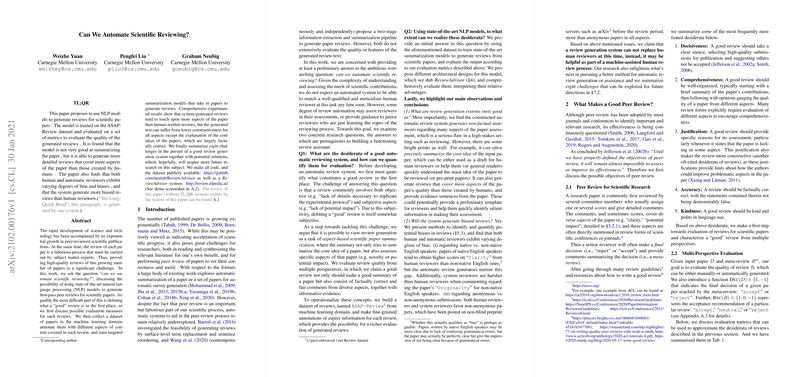Automating Scientific Reviewing: Opportunities and Challenges
The paper "Can We Automate Scientific Reviewing?" by Weizhe Yuan, Pengfei Liu, and Graham Neubig from Carnegie Mellon University, explores the feasibility of utilizing state-of-the-art NLP models to automate the preliminary stages of peer review for scientific papers. This endeavor is motivated by the exponential growth in scientific publications, which has created a substantial burden on human reviewers. The authors rigorously evaluate the capability of these models to generate reviews comparable to those written by human experts, while highlighting both their strengths and deficits.
Evaluation Framework and Dataset
Central to this paper is the creation of a dataset, ASAP-Review, which comprises machine learning papers annotated with various aspects pertinent to peer reviews. These aspects include clarity, originality, motivation, and replicability, among others. The dataset is an essential resource for developing models capable of generating reviews that are not only summarizations of the core ideas but also cover multiple dimensions of a paper's merit.
The authors propose a comprehensive multi-perspective evaluation framework for assessing the quality of automatically generated reviews. This framework evaluates reviews based on several desiderata, including decisiveness, comprehensiveness, justification, accuracy, and kindness. These evaluation metrics provide granular insights into the effectiveness and potential biases in generated reviews.
Model Design and Evaluation
The paper employs BART, a pre-trained sequence-to-sequence model, as the backbone for review generation. Given the typical length of scientific papers, the authors explore various strategies to handle long input texts, concluding that a two-stage extract-then-generate approach best balances performance and practicality.
The experimental results are telling. While the generated reviews demonstrate a strong ability to summarize a paper's core ideas and offer extensive coverage across various review aspects, they fall short in delivering decisive and factually accurate assessments. The models tend to generate non-factual statements in high-stakes review settings, and certain stylistic biases have been identified in their outputs. Notably, the automatic reviews frequently mirror common high-frequency sentence patterns observed in the training corpus.
System Bias and Fairness
A significant part of the paper focuses on analyzing biases present in both human-generated and machine-generated reviews. The paper finds that system-generated reviews exhibit biases similar to human reviews, favoring native English speakers in certain aspects like clarity. Additionally, the models appear to give slightly harsher judgments on originality for non-native authors, revealing a dimension of bias that requires mitigation.
Implications and Future Directions
The implications of this research extend both practically and theoretically. Practically, even with current limitations, automatic review generation systems like ReviewAdvisor can potentially serve as assistants to human reviewers by providing preliminary templates or highlighting key points and evidence in the papers. For novice reviewers, these systems might offer scaffolded support in learning the review process.
Theoretical implications center on the challenges laid bare by the paper: the need for improved long document modeling techniques, better incorporation of external knowledge in review generation, and mitigation of biases in model outputs. Continued advancements in these areas could significantly enhance the fidelity and usefulness of automated review systems.
In summary, this paper advances the conversation on automating scientific reviews, providing a foundational dataset and evaluation metrics that could guide future research. It calls for a nuanced approach to harnessing AI in review processes, emphasizing that automation should augment, rather than replace, the human elements of peer review. Future research could explore more robust de-biasing techniques, integrate richer context understanding, and improve aspect-specific accuracy in generated reviews.
